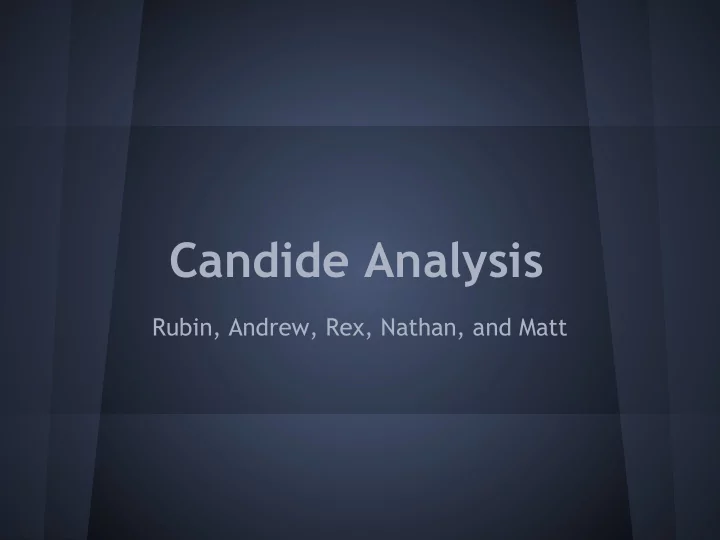

Candide Analysis Rubin, Andrew, Rex, Nathan, and Matt
Black Humor .Black humor a type of humor that invokes horror in an effort to reveal widespread social turmoils or ills. .Voltaire uses this in his "Candide," on pages 53-54: "I was born at Naples, where they castrate two or three thousand children every year. Some die, some acquire more beautiful voice than any woman has, and some become Prime Ministers." . Voltaire is employing the horror of castration, and using it expose the ill that befalls them; using it for humor. Some of them acquire a beautiful voice, others acquire a position of political power, and they've experienced trauma beforehand.
Sarcasm . The equivalent to irony; used in literature as apparent praise used for dispraise. .Voltaire uses this in his "Candide," on page 34: " Nothing is more likely, said Candide, But oil and wine for pity's sake!" . This is intoned, he's saying that nothing could be more likely, but he really doesn't believe that and just wants "oil and wine, for pity's sake!"
Socratic Irony Page 80, “...if our friend Pangloss had seen Eldorado, he would not have kept on saying that Castle Thunder-ten-tronckh was the loveliest place on Earth; it shows that people ought to travel.” In Socratic irony, an ignorant character is used to point out flaws in an idea or philosophy. Here, Candide performs this on Pangloss' philosophy.
Savage Irony Page 36, “The University of Coimbra had pronounced that the sight of a few people ceremoniously burned alive before a slow fire was an infallible prescription for preventing earthquakes...” Savage Irony is using an understatement to ridicule someone or something , in this case the Church's practice of Auto-da-fé.
Harmless Wit Invokes light-hearted laugh or smile “The only thing which annoyed him [Candide] was parting company with his sheep. He left it to the Academy of Sciences at Bordeaux, who set for the subject of their annual prize an essay on why the sheep’s fleece was red. The prize was awarded to a Northern scholar, who demonstrated by a formula, A plus B minus C over Z, that the sheep was necessarily red and ought to die of scab.” pg 97 Scholar somehow uses a "formula" to determine that the sheep ought to die of scab, which is ridiculous.
Witticism A saying or brief verbal expression that is intended to produce a comic surprise “‘How many plays have been written in French?’ he asked. ‘About five or six thousand,’ replied the abbe. ‘That’s a lot,’ he remarked; how many are good?’ ‘Fifteen or sixteen,’ replied the other. ‘That’s a lot,’ said Martin.” pg 99 This is a funny, short saying.
Aphorism A pointed statement that underscores a serious maxim or truth “My children help me to farm it, and we find that work banishes those 3 great evils, boredom, vice, and poverty.” p.143 This is an aphorism because it is a short statement that directly points to a truth. It is a philosophy.
Tendency Wit An aggressive statement which directs a laugh at a particular person or thing. “Pangloss taught mataphysico-theologo-cosmolo- nigology.” p.20 Attacks philosophers by saying that they do not spend time enough on any one subject to be considered a master of that art and therefor know nothing.
Humorous Utterance -A satirical statement that is humorous for the audience but not for the speaker. Example: “‘It is proved,’ he used to say, ‘that things cannot be other than they are, for since everything was made for a purpose, it follows that everything is made for the best purpose.’” -Pg 20 Candide -Speaker sees this as vital information. -Statement is redundant and silly to the read
Indirect Satire -Satire that is presented through a fictional narrative and not using the first person. Example: -Candide -Story mocks many aspects of society -All from viewpoint of Voltaire -Uses fictional characters to tell story
Recommend
More recommend